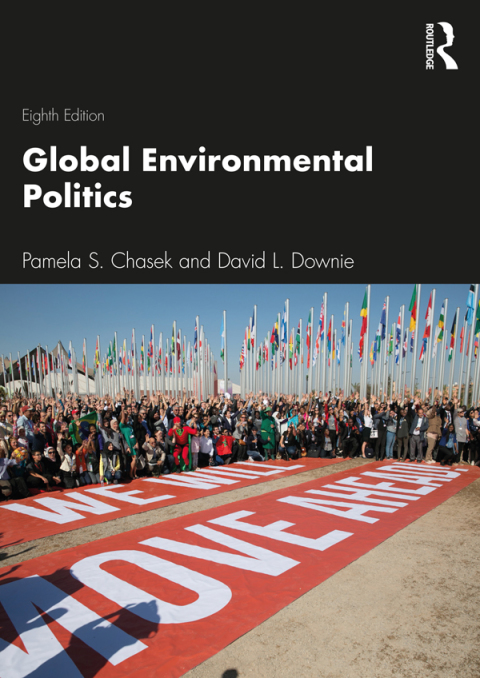Description
Efnisyfirlit
- Cover
- Half Title
- Praise Page
- Title Page
- Copyright Page
- Contents
- List of Figures
- List of Tables
- List of Boxes
- List of Photos
- Preface
- Acknowledgments
- Selected Acronyms
- Chapter 1 The Emergence of Global Environmental Politics
- Abstract
- Global Macrotrends
- Population Growth and Resource Consumption
- Natural Resources and Pollution
- An Introduction to Global Environmental Politics
- International Regimes in Global Environmental Politics
- Global Environmental Regimes
- Theoretical Approaches to International Regimes
- Paradigms in Global Environmental Politics
- Sustainable Development: Rise of an Alternative Paradigm
- Globalization and Sustainable Development
- Environmental Change as a Security Issue
- The Precautionary Principle
- Conclusion
- Notes
- Chapter 2 Actors in the Environmental Arena
- Abstract
- Nation-State Actors: Roles and Interests
- Domestic Political Factors
- Comparative Costs and Benefits of Environmental Regimes
- International Political and Diplomatic Considerations
- Subnational Actors
- Intergovernmental Organizations
- Setting Agendas and Influencing Regime Development
- Providing Independent and Authoritative Information
- Developing Nonbinding Norms and Codes of Conduct
- Influencing National Development Policies
- Scientific Bodies
- Treaty Secretariats
- Treaty Secretariats as Knowledge Brokers
- Treaty Secretariats and the Political Process
- International Financial Institutions
- Regional and Other Multilateral Organizations
- Nongovernmental and Civil Society Organizations
- Influencing Environmental Regime Formation
- Business and Industry
- Influence on Regime Formation
- Industry and Nonregime Issues
- Conclusion
- Notes
- Chapter 3 The Development of Environmental Regimes: Stratospheric Ozone, Climate Change, Hazardous Waste, Toxic Chemicals, and Mercury
- Abstract
- Stratospheric Ozone Depletion
- Regime Strengthening
- The Ozone Regime Today
- Explaining the Ozone Regime
- Climate Change
- Round 1: The United Nations Framework Convention on Climate Change
- Round 2: The Kyoto Protocol
- Round 3: The Copenhagen Accords
- Round 4: The Paris Agreement
- Round 5: Beyond Paris
- Hazardous Waste
- Regime Strengthening: The Ban Amendment and the Liability Protocol
- Regime Strengthening: Action Plans, Regional Centers, and Technical Guidelines
- Regime Strengthening: E-Waste
- Regime Strengthening: Plastic Waste
- Synergies
- Moving Forward
- Toxic Chemicals
- Regime Strengthening: Adding New Chemicals
- Regime Strengthening: Financial and Technical Assistance
- Regime Strengthening: Partnerships and Networks
- Regime Strengthening: Synergies
- Regime Non-Strengthening: Noncompliance Procedures
- The Chemicals Regime Today: Successes and Challenges
- Mercury
- International Action Begins
- Mercury Emissions: Why One Treaty Essentially Needed to Be Several Treaties
- Regime Creation
- Key Provisions
- Regime Expansion and Evaluation
- Conclusion
- Notes
- Chapter 4 The Development of Environmental Regimes: Natural Resources, Species, and Habitats
- Abstract
- Biodiversity Loss
- Conservation of Biological Diversity
- Cartagena Protocol on Biosafety
- Access and Benefit Sharing
- Moving Forward
- Marine Biodiversity in Areas Beyond National Jurisdiction
- Agenda Setting
- Issue Definition in the Working Group
- Unpacking the Package
- Let the Conference Begin
- International Trade in Endangered Species
- African Elephants
- Controlling International Trade in Endangered Species
- Whaling
- Regime Strengthening
- Desertification and Land Degradation
- Implementing and Strengthening the Convention
- The Science-Policy Nexus
- Land Degradation Neutrality
- Moving Forward
- Conclusion
- Notes
- Chapter 5 Effective Environmental Regimes: Obstacles and Opportunities
- Abstract
- Obstacles to Creating Effective Environmental Regimes
- Systemic Obstacles
- Absence of Necessary Conditions: Concern, Contractual Environment, and Capacity
- Lowest-Common-Denominator Problems
- Time-Horizon Conflicts
- Characteristics of Global Environmental Issues
- Interconnections Among Environmental Issues
- Regime Design Difficulties
- Changing Views on the Principle of Common but Differentiated Responsibilities
- Obstacles to Effective National Implementation of and Compliance with Global Environmental Regimes
- Inadequate Translation of Regime Rules into Domestic Policy
- Insufficient Capacity or Commitment to Implement, Administer, Monitor, or Enforce Domestic Policy
- Misperception of Relevant Costs and Benefits
- Costs of Compliance
- Poorly Designed Regimes
- Many Regimes, Little Coordination
- Opportunities to Improve Effective Implementation and Compliance
- Raise Awareness and Concern
- Create Market Incentives
- Eliminate Counterproductive Subsidies
- Augment Coordination Among Regimes and Conventions
- Improve Monitoring and Reporting
- Generate Publicity
- Consider Sanctions
- Build Domestic Capacity
- Increasing and Improving Financial and Technical Assistance
- Focus Multilateral and Bilateral Assistance on the Sustainable Development Goals
- Develop Revenue from Regime Mechanisms
- Pollution Taxes
- Exchange Debt Obligations for Sustainable Development Policy Reforms and Investments
- Remove Trade Barriers and Subsidies to Promote Green Global Trade and Investment
- South–South Financing and Investment
- Triangular Cooperation
- Public–Private Partnerships
- Conclusion
- Notes
- Chapter 6 Environmental Politics and Sustainable Development
- Abstract
- North–South Relations, the Environment, and Sustainable Development
- Emergence of Sustainable Development
- The Rio Principles
- Changing Economic Realities
- The Relationship Between Multilateral Environmental Agreements and the World Trade Organization
- Environmental Issues and the World Trade Organization Dispute Settlement System
- Ecolabeling, Standards, and Certification
- Subsidies and the Environment
- Liberalizing Trade in Environmental Goods and Services
- The Outlook for Trade and Environment
- Balancing the Environmental and Sustainable Development Agendas
- The Millennium Development Goals
- The Sustainable Development Goals
- Conclusion
- Notes
- Chapter 7 The Future of Global Environmental Politics
- Abstract
- Global Environmental Governance in a Changing International System
- The Continuing Evolution of Global Environmental Governance
- Evolution of Multilateral Environmental Agreements
- Evolution of the United Nations Environment Programme
- High-level Political Forum on Sustainable Development
- Does Evolution Mean Change?
- Conclusion: The Prospects for Global Environmental Politics
- Notes
- Index







Reviews
There are no reviews yet.